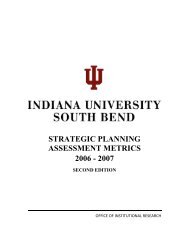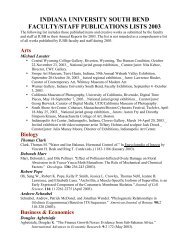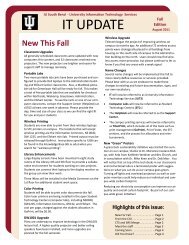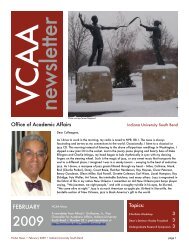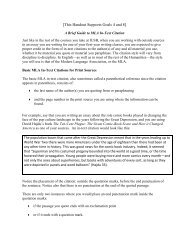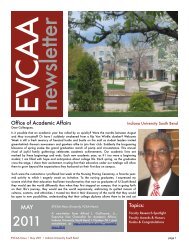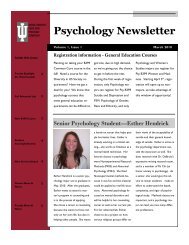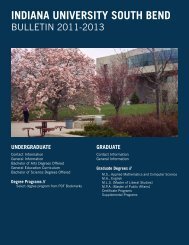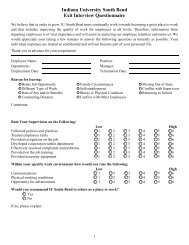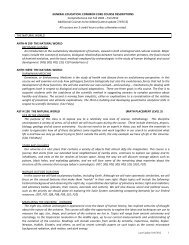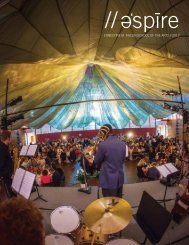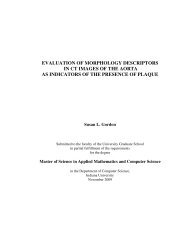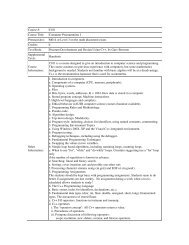Current version - Indiana University South Bend
Current version - Indiana University South Bend
Current version - Indiana University South Bend
You also want an ePaper? Increase the reach of your titles
YUMPU automatically turns print PDFs into web optimized ePapers that Google loves.
RESERVE OFFICERS’ TRAINING CORPS COURSE DESCRIPTIONS 4425<br />
MIL: Military Sciences<br />
MIL-G 111<br />
MIL-G 112<br />
MIL-G 211<br />
MIL-G 212<br />
FOUNDATIONS of officership (1 cr.)<br />
A study of the organization of the Army<br />
with an emphasis on understanding the<br />
implementation of officership, leadership,<br />
and Army values. Military courtesy,<br />
discipline, customs, and traditions of<br />
the service, fitness, and communication<br />
are taught and demonstrated through<br />
practical exercise. Includes a 48-hour<br />
field training exercise and a weekly<br />
two-hour laboratory emphasizing basic<br />
soldier skills such as land navigation and<br />
marksmanship. I<br />
Basic Military Leadership (1 cr.)<br />
A study of functions, duties, and<br />
responsibilities of junior leaders.<br />
Emphasizes operations of the basic<br />
military team to include an introduction<br />
to the Army’s problem solving process<br />
as well as the fundamentals of time and<br />
resource management. Includes a 48-<br />
hour field training exercise and a weekly<br />
two-hour laboratory emphasizing basic<br />
soldier skills such as first aid, United States<br />
weapons, and military communication. II<br />
INDIVIDUAl Leadership (2 cr.)<br />
Study and application of map reading<br />
skills, military communications, and<br />
development of individual leadership<br />
techniques by learning the fundamentals<br />
of small-unit tactical operations.<br />
Emphasis on individual physical fitness<br />
and conducting self evaluations to<br />
facilitate growth. Includes a 48-hour field<br />
training exercise and a weekly two-hour<br />
laboratory that offers the opportunity<br />
to demonstrate learned leadership<br />
techniques, along with instruction on<br />
basic military skills of land navigation<br />
and rifle marksmanship. I<br />
lEADERSHIP and teamwork (2 cr.)<br />
Study and application of mission planning<br />
and orders with an emphasis on small<br />
unit leadership in tactical settings. Land<br />
navigation, map reading, marksmanship,<br />
and communication skills are evaluated.<br />
Students are expected to demonstrate<br />
that they have mastered basic soldier<br />
skills and leadership fundamentals.<br />
Includes a 48-hour field training exercise<br />
and a weekly two-hour laboratory that<br />
offers the opportunity to demonstrate<br />
learned leadership techniques, along with<br />
advanced instruction on military skills. II<br />
MIL-G 3213<br />
MIL-G 311<br />
MIL-G 312<br />
MIL-G 411<br />
MIL-G 412<br />
leadership training course (Basic<br />
Camp) (5 cr.)<br />
Students wishing to enter this program<br />
can apply to attend the four-week<br />
summer camp at Fort Knox, Kentucky.<br />
Attendance and successful completion<br />
of the Leadership Training Course (LTC)<br />
summer camp, is substituted for the basic<br />
courses (MIL-G 111, MIL-G 112, MIL-G<br />
211, and MIL-G 212). At the LTC, the<br />
student is trained, fed, and housed at the<br />
expense of the government. The student<br />
also receives travel pay plus a salary of<br />
approximately $672 for the four-week<br />
program. Interested students should<br />
contact the military science department<br />
at (574) 631-6896 or 1-800-UND-ARMY<br />
for more details. Upon the successful<br />
completion of MIL-G 213, the student is<br />
eligible for enrollment in the advanced<br />
Army ROTC program at the <strong>University</strong><br />
of Notre Dame and eligible to receive an<br />
Army ROTC two-year scholarship; which<br />
provides for tuition, books, and fees for its<br />
recipients; as well as a monthly stipend of<br />
between $450-500 per month. S<br />
Leadership and problem solving (2 cr.)<br />
Military decision making, problem<br />
analysis, and integrated planning of<br />
platoon operations. Analysis of the<br />
components of leadership through<br />
practical exercises and historical<br />
examples. Includes one 48-hour field<br />
training exercise. I<br />
lEADERSHIP and ethics (3 cr.)<br />
Advanced military decision making,<br />
problem analysis and integrated planning<br />
with synchronization of multiple assets.<br />
This is conducted on the basis of platoon<br />
operations and tactics. Includes two 48-<br />
hour field exercises. II<br />
The Professional Officer (2 cr.)<br />
Advanced study of military leadership<br />
and management. Discusses staff<br />
organization, functions, and processes.<br />
Analyzes counseling methods and<br />
responsibilities. Examines organization<br />
climate and training management. I<br />
Military Management (2 cr.)<br />
Study of the Law of War, Code of Conduct,<br />
personnel management, information<br />
on awards, separations, promotions,<br />
evaluations, assignments, and counseling<br />
techniques. Includes precommissioning<br />
seminars to address current military<br />
problems, trends, and customs. II



